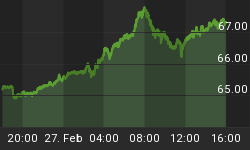"...When this bull market in 'luck' runs out, shorting the Pound might prove a wise course instead of buying fixed-income gilts..."
GOOD NEWS for lucky cash-savers in Britain. The Pound in their pocket lost only one-third of a penny in purchasing power during May 2007.
Okay, so it dropped 2.5p from a year earlier - and £1 spent on the High Street will buy 15% less than it commanded in spring 1997.
Throw in mortgage repayments, local government tax and buildings insurance, in fact, and the Pound has now lost one quarter of its value over the last decade. So says the old Retail Price Index.
But luckily for home-buyers and leveraged investors alike - and is there really much difference at heart? - property expenses and indirect taxes just don't count anymore. Inflation in the cost of consumable goods and services is the only cost of living that the Bank of England worries about. And the CPI, a data series now running for a little more than a decade, just tiptoed further away from the record high it hit in March.
Lucky old Mervyn King! He can keep the lid on his fountain pen for another month. No open letters to the Chancellor in June, even if the money supply is rising at 14% year on year.
"The UK's inflation rate fell to the lowest in seven months in May after utilities cut gas and electricity bills," as Bloomberg reports this morning. Cue the Pound to sell off on the currency markets, even though the Trimmer himself was out on a jolly in Cardiff last night, talking tough about raising rates.
"Our job," said Dr King of central banking, "is rather like taking part in a 'spot the ball' competition...'Spotting the shock' is a perpetual challenge for us. The shocks we have identified are the reasons we raised Bank Rate four times over the past year."
Boo! Total output in the UK has grown at an annualised rate of 3% for the last 18 months, notes the nervous Dr. King, "the longest run of stable output growth since 1997."
Boo! World GDP growth has averaged 5% per year since 2003 - and while the flood of cheap labour into Britain should have "shocked" inflation to the downside, says the guvnor, business failed to hire fast enough to depress higher wage claims.
Boo! "Wider and cheaper availability of credit was a 'shock' that boosted spending," says the man who's done more than most to make credit cheaper and more widely available, "thereby increasing the stock of money - a 'money supply shock'...and this will push up on inflation."
Boo! "Sharp rises in the prices of energy and food," Mervyn King says, "have squeezed spending on other goods and services, putting downward pressure on those prices. That is why measures of 'core inflation' that strip out certain prices can be highly misleading."
Which is lucky again for the Trimmer. Consumer prices rose 2.5% last month compared with May 2006, said the Office for National Statistics today, a nice deceleration from April's 2.8% rate of increase. But so-called core inflation, excluding food, alcohol, energy and tobacco, accelerated to 1.9% from 1.8% - "matching the highest level since 1997," as Bloomberg reports.
You might wonder quite what's left in a cost-of-living index after you've stripped out food, booze, fags, electricity, gas and petrol. Ignore these bills, and you'll fail to notice - as perhaps the Old Lady has failed to spot - that housing and fuel costs rose 9.1% last month from May 2006. Tobacco rose 6.3%. Getting drunk became 3.2% more expensive.
But "the increase in core inflation is ongoing and that means inflation may go back up," reckons Alan Clarke, an economist at BNP Paribas in London. "We're still in a hiking environment, and not only in the UK."
The mere thought of higher global interest rates continues to spook the US bond market. The yield on 10-year Treasuries - the global benchmark for the price of money - broke above 5.0% for the first time in nearly a year last week. Spotting that shock caused a sell off in equities, junk bonds, credit derivatives, even gold.
The 10-year US yield has kept rising since then as bond prices kept falling. This morning in London, bond traders wouldn't buy the 10-year unless its price was so low, the yield offered was above 5.17%.
Will 5.17% prove a worthwhile annual income for the coming 10 years? Washington will auction off $8 billion in new 10-year notes later today. What the primary market makes of this fresh call for finance might show where rates are headed for here.
Once you've bought a bond, remember, your yield is locked in - and that's at best, too. At worst, the debtor goes bankrupt - or simply neglects to pay up. In between sits the slow destruction of wealth that's come to be known as "inflation".
Sovereign governments never default, of course - Argentina, Russia, Mexico, Italy and most of the rest of the world apart. That's why the 10-year US Treasury sets the benchmark for "risk free" returns. Hold off laughing for a minute, however, and ask how much risk is there in owning UK government bonds today?
Unlike the United States bond market, UK gilt prices are so high, they point to lower interest rates from here. Luckily for Gordon Brown - the new prime minister - in other words, the City and Wall Street still love the Pound, even though Sterling keeps abusing cash savers and destroying their wealth after tax and inflation.
Buy gold, short money still looks to a good call. Rising bond yields express only a growing acceptance that the value of money is shrinking.
And when this bull market in "good luck" runs out, selling the Pound might prove a wise course compared with buying fixed-income gilts.















